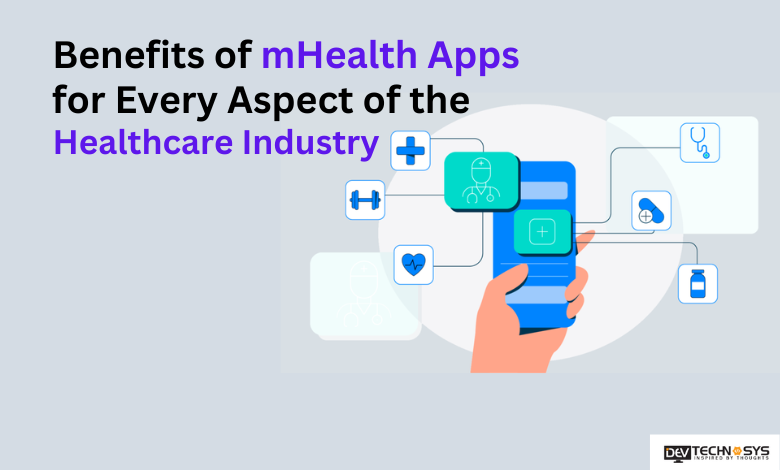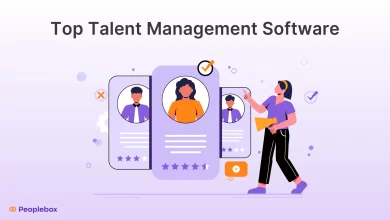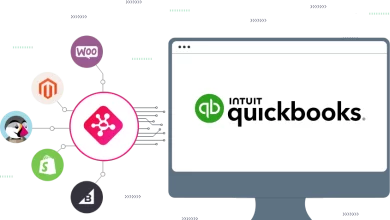Benefits of mHealth Apps for Every Aspect of the Healthcare Industry

Welcome to this blog, where we will be discussing the benefits of mHealth apps for every aspect of the healthcare industry. In recent years, mobile health technology, known as mHealth, has revolutionized the healthcare industry.
mHealth apps support and enhance healthcare services by providing access to medical information, monitoring patient health, and improving communication between healthcare providers and patients.
With the increasing use of smartphones and mobile devices, mHealth apps have become a popular way to manage healthcare needs.
They can be used for various purposes, such as tracking health and fitness goals, managing chronic conditions, and providing real-time medical support.
In this blog, we will explore the many benefits of healthcare software development for different aspects of the healthcare industry.
We will examine how mHealth technology can improve patient outcomes, enhance clinical efficiency, reduce healthcare costs, and increase patient engagement.
What is mHealth?
mHealth (mobile health) refers to the use of mobile devices such as smartphones, tablets, and wearables for healthcare purposes. It includes using mobile apps, text messages, and other forms of digital communication to deliver health information, monitor health conditions, and provide medical care.
mHealth can help improve access to healthcare services, particularly in remote or underserved areas, and increase patient engagement and self-management of health conditions.
It can also help healthcare providers deliver more efficient and effective care by remotely monitoring patient health and providing real-time feedback and support.
Examples of mHealth applications include apps that track physical activity and nutrition, monitor chronic conditions like diabetes or hypertension, provide mental health support, and facilitate telemedicine consultations between patients and healthcare providers.
Benefits of mHealth Apps for Every Aspect of the Healthcare Industry
Healthcare Software Development has become a significant component of the healthcare industry. mHealth apps have transformed the traditional healthcare model and brought numerous benefits for healthcare providers and patients. This article will explore the benefits of mHealth apps for every aspect of the healthcare industry.
1. Improved Patient Engagement and Empowerment
mHealth apps have the potential to improve patient engagement and empowerment. Patients can use mHealth apps to monitor their health, track their progress, and communicate with their healthcare providers.
These apps can provide real-time information, support self-care management, and offer access to educational materials that can help patients make informed decisions about their health.
2. Efficient Management of Chronic Conditions
Chronic diseases such as diabetes, heart disease, and hypertension require continuous management, and mHealth apps can help patients manage these conditions more efficiently.
These apps can track symptoms, medication adherence, and lifestyle changes and provide patients with reminders, alerts, and personalized recommendations to improve their health outcomes. Hybrid app development service if you want to develop a health application.
3. Increased Access to Healthcare
mHealth apps can improve access to healthcare services, particularly in rural or underserved areas. Patients can use these apps to connect with healthcare providers, schedule appointments, and receive remote consultations.
mHealth apps can also help healthcare providers deliver healthcare services to patients who live far away from healthcare facilities.
4. Improved Data Collection and Analysis
mHealth apps can collect and analyze vast amounts of patient data, which can help healthcare providers make informed decisions about patient care.
These apps can track patient vitals, medication adherence, and lifestyle behaviors, which can be used to monitor patient progress and identify potential health issues.
5. Reduced Healthcare Costs
mHealth apps can help reduce healthcare costs by improving patient outcomes, preventing hospital readmissions, and reducing the number of unnecessary medical procedures.
These apps can help patients manage their health and prevent complications, saving healthcare providers money and improving the overall quality of care. Only the best Mobile App Development Services provider can help you create health applications with an excellent user interface.
6. Improved Medication Adherence
Medication non-adherence is common among patients, particularly those with chronic conditions. mHealth apps can provide patients with medication reminders, refill notifications, and information about drug interactions, which can improve medication adherence and prevent adverse health outcomes.
7. Streamlined Workflow and Improved Efficiency
mHealth apps can streamline healthcare workflows, reducing administrative burdens and improving efficiency. These apps can help healthcare providers manage patient information, schedule appointments, and communicate with patients, saving time and improving the quality of care.
8. Better Patient Outcomes
Overall, custom android app development in the healthcare industry can improve patient outcomes by improving patient engagement, reducing healthcare costs, improving data collection and analysis, and enhancing medication adherence.
By providing patients with the tools they need to manage their health, mHealth apps can improve health outcomes and enhance the patient experience.
What Impact will health have on the Healthcare Industry?
Mobile health, also known as mHealth, is a rapidly growing field involving mobile devices such as smartphones, tablets, and wearable devices to support healthcare and medical services. Here are some current trends in mobile health solutions:
1. Telemedicine:
Telemedicine involves the use of technology to provide healthcare services remotely. With the increased use of telemedicine, patients can receive medical care and consultations without visiting a healthcare facility in person.
2. Wearable Technology:
Wearable devices, such as smartwatches and fitness trackers, are increasingly used for health monitoring and management. These devices can track vital signs, physical activity, and other health metrics, provide feedback, and motivate patients to make healthier choices.
3. AI and Machine Learning:
Artificial intelligence (AI) and machine learning are used in mobile health solutions to improve the accuracy of diagnosis and treatment recommendations. These technologies can analyze large amounts of data to identify patterns and predict a patient’s health.
4. Chronic Disease Management:
Mobile health solutions are being used to manage chronic diseases such as diabetes and hypertension. Apps and wearable devices can help patients track their symptoms, medication, and lifestyle habits and provide personalized recommendations to manage their condition.
5. Mental Health Support:
Mobile health solutions are being used to provide mental health support, including apps and platforms for online therapy and mindfulness meditation. These solutions can help improve access to mental healthcare and reduce the stigma associated with seeking help.
6. Remote Patient Monitoring:
Remote patient monitoring involves using mobile devices to monitor a patient’s health status and provide real-time feedback to healthcare providers.
It can help improve patient outcomes and reduce healthcare costs by allowing providers to intervene early if a patient’s condition deteriorates.
In conclusion, mobile health solutions are rapidly evolving and potentially transform healthcare delivery by improving access to care, increasing patient engagement, and reducing healthcare costs. So Hire Healthcare Software Developers to create mhealth applications with effective user experience.
Takeaway!
In conclusion, mHealth apps have transformed the healthcare industry by improving patient engagement, streamlining healthcare workflows, and reducing healthcare costs.
These apps can help patients manage their health, prevent complications, and improve their quality of life. They can also provide healthcare providers with valuable patient data, which can be used to make informed decisions about patient care.
As mHealth apps continue to grow, we can expect to see even more benefits for patients and healthcare providers alike.






